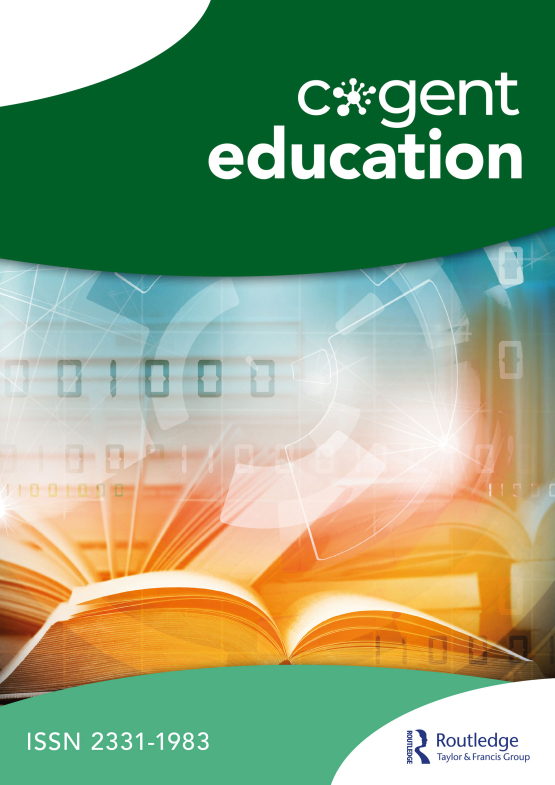Submit a Manuscript to the Journal
Cogent Education
For an Article Collection on
Generative AI in Bilingual Education: Pedagogical Possibilities and Equity Challenges
Manuscript deadline


Article collection guest advisor(s)
Dr. Zhongfeng Tian,
Rutgers University--Newark
zhongfeng.tian@rutgers.edu
Generative AI in Bilingual Education: Pedagogical Possibilities and Equity Challenges
Generative artificial intelligence (GenAI) tools such as ChatGPT, Claude, and Gemini are transforming educational environments by enabling new forms of content creation, language modeling, and instructional personalization. While much of the discourse around GenAI in education has focused on English-dominant or -medium contexts, its implications for bilingual education remain largely unexamined. Bilingual education encompasses a range of instructional models—such as dual language immersion, transitional bilingual education, and heritage language programs—that use two languages for academic content delivery. These contexts, which serve diverse student populations and aim to support both language development and cultural identity, present distinct pedagogical and technological opportunities. This Article Collection aims to explore how GenAI intersects with the specific goals, challenges, and values of bilingual education across global contexts.
Bilingual education programs are often rooted in equity-based goals, aiming to empower linguistically and racially marginalized communities through access to multilingual learning. As GenAI tools are increasingly adopted in schools, they raise critical questions about linguistic representation, bias, and access in multilingual settings. These tools, which are largely developed and trained on English-dominant datasets, may inadvertently reproduce linguistic hierarchies, marginalize heritage languages, and privilege standard language ideologies. At the same time, GenAI presents novel possibilities for differentiated instruction, multilingual scaffolds, and content creation across languages. This Article Collection addresses the urgent need to examine how GenAI is reshaping bilingual classrooms, and how educators, researchers, and policy makers can critically and creatively leverage these technologies in service of linguistic justice and pedagogical innovation.
We invite submissions that critically examine the impact of GenAI on teaching, learning, assessment, curriculum design, and teacher education in bilingual education contexts. Topics of interest include but are not limited to: (1) classroom-based practices involving GenAI in dual language and heritage language programs; (2) teacher and student perspectives on GenAI integration; (3) GenAI’s role in bilingual curriculum development and academic language support; (4) challenges related to linguistic and cultural representation in AI-generated content; (5) equity-focused strategies for professional development and policy design. The Collection is open to empirical research articles, and theoretical or conceptual essays. We especially encourage contributions that highlight underrepresented languages, Indigenous and community-based bilingual education models, and international perspectives. Together, the papers will offer a critical foundation for understanding and shaping the future of bilingual education in the age of artificial intelligence.
All manuscripts submitted to this Article Collection will undergo a full peer-review; the Guest Advisor for this Collection will not be handling the manuscripts (unless they are an Editorial Board member).
Please review the journal scope and author submission instructions prior to submitting a manuscript.
The deadline for submitting manuscripts is 30 April 2026.
Please contact Kristen Brida at kristen.brida@taylorandfrancis.com with any queries and discount codes regarding this Article Collection.
Keywords
- Generative Artificial Intelligence
- Bilingual Education
- Educational Technology
- Equity in Education
- Heritage Language Learning
About the Guest Advisor
Zhongfeng Tian, Ph.D. is Associate Professor of Bilingual Education in the Department of Urban Education at Rutgers University–Newark, USA. Theoretically grounded in translanguaging, his research centers on working with pre- and in-service teachers to provide bi/multilingual students with equitable and inclusive learning environments in ESL and dual language bilingual education contexts, and preparing culturally and linguistically competent teachers with social justice orientations. He serves on the editorial boards of leading journals including TESOL Quarterly, International Journal of Bilingual Education and Bilingualism and International Multilingual Research Journal.
Conflict of Interest Disclosure
Dr. Tian does not have any Conflicts of Interest to disclose
Benefits of publishing open access within Taylor & Francis
Global marketing and publicity, ensuring your research reaches the people you want it to.
Article Collections bring together the latest research on hot topics from influential researchers across the globe.
Rigorous peer review for every open access article.
Rapid online publication allowing you to share your work quickly.
Submission Instructions
All manuscripts submitted to this Article Collection will undergo desk assessment and peer-review as part of our standard editorial process. Guest Advisors for this collection will not be involved in peer-reviewing manuscripts unless they are an existing member of the Editorial Board. Please review the journal Aims and Scope and author submission instructions prior to submitting a manuscript.

